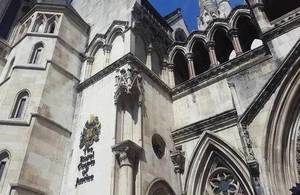New tool to tackle economic crime
Plans published for a new way of dealing with economic crime.

Plans for a new tool to tackle economic crime have been published for consultation by Solicitor General Edward Garnier QC and Justice Minister Crispin Blunt.
Under Deferred Prosecution Agreements (DPA), companies would agree to publically admit wrongdoing, and meet tough conditions such as payment of substantial penalties, undertaking internal reform and submitting to regular review and monitoring.
The whole process would be overseen by a judge and the threat of full prosecution would remain hanging over a company should they fail to comply with the agreement.
Solicitor General Edward Garnier QC said:
If we can encourage companies to self-report and come clean, pay penalties and mend their ways, the time and expense of investigations and prosecutions will be better spent elsewhere, enabling us to bring more individuals and companies to justice.
An important aim of any DPA system would be to allow investigators and prosecutors to focus resources on those cases where a prosecution is in the public interest - and there will always be some where it is the only option.
Justice Minister Crispin Blunt said:
Law enforcement agencies have told us that they do not have the tools they need to tackle increasingly complex economic crimes. Investigations can take several years and cost millions of pounds, with no guarantee of success, which means victims wait far too long for reparation. Or indeed receive no payback at all.
More clearly needs to be done. Deferred Prosecution Agreements will give prosecutors extra tools to tackle this type of crime and bring about a just outcome - which punishes the wrongdoer, ensures the surrendering of any proceeds and makes amends to victims.
Economic crime is increasingly complex, making it difficult to tackle effectively. As the complexity and size of commercial organisations grow, so too do the difficulties of identifying criminal activity and of bringing any organisation which commits such crime to justice. This is especially so in the case of organisations that operate, and so may have committed wrongdoing, in more than one country to which more than one set of laws can be applied.
DPAs would be available for prosecutors to use alongside existing methods, to give them the flexibility to secure appropriate penalties for wrongdoing, at the same time as achieving better outcomes for victims.
A DPA is an agreement between a prosecutor and a commercial organisation that in return for complying with a range of conditions the prosecutor would defer a criminal prosecution.
An independent judge would oversee the development of the agreement to ensure it is fair, in the public interest and that the conditions properly reflect the nature of the wrongdoing. This will include the reparation made to victims.
If, at the end of the deferral period, the prosecutor is satisfied the organisation has fulfilled its obligations, there is no prosecution on the charges laid. If, on the other hand, the commercial organisation fails to meet its obligations, further penalties are available and the original criminal proceedings could be revived.